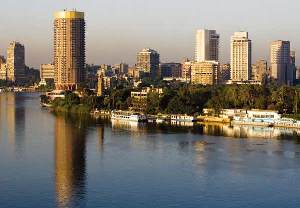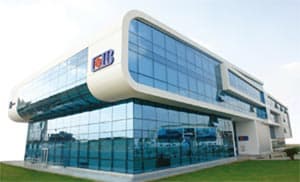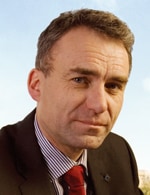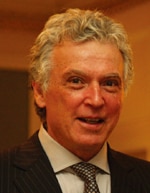GETTING SMART
By Gordon Platt
Egypt is turning to information technology to create a knowledge-based economy.

Near the pyramids at Giza, on the outskirts of Cairo, Egypt’s first technology park is changing the desert landscape. A total of 43 modern buildings have been constructed on the 600-acre site, known as Smart Village. Prime minister Ahmed Nazif, who holds a doctorate in computer engineering from McGill University in Canada, inaugurated the latest phase of the project in January. He toured IBM’s new business process outsourcing and call center, as well as the premises of the Information Technology Industry Development Agency (ITIDA) and the Information Technology Institute. Thirty more buildings, with signature blue-tinted solar glass, will be erected in Smart Village in the next two years.
Egypt is one of the world’s fastest-growing outsourcing locations. A second major technology park, Maadi, opened this summer in downtown Cairo. ITIDA, which is affiliated with the ministry of communications and information technology, is responsible for attracting foreign direct investment (FDI) to Egypt’s IT industry. It has signed an agreement with Intel to transfer technical expertise to Egypt-based companies. Smart Village is home to local units of Microsoft, Cisco, HP, Oracle, SAP and Satyam. China-based Huawei, which develops broadband network solutions, operates a training program with United Arab Emirates-based Etisalat. Telecom Egypt, Vodafone and MobiNil are all represented, as is Raya Holding, formed by the merger of seven local IT and communications companies.
Egypt’s economy grew at a 5.9% rate in the second quarter of 2010, boosted by double-digit growth in the construction, IT and telecom sectors. This represented a slight acceleration from 5.8% growth in gross domestic product in the first three months of this year.
Egypt’s economy continued growing throughout the global financial crisis, thanks to strong domestic demand and the country’s limited integration into the world financial system. With 82 million people, Egypt is the most populous Arab country. It has become a magnet for FDI following sustained economic reforms, which have created a favorable business environment and a stable financial services sector.
As the global economy recovers, the Egyptian government says that improvements in manufacturing exports, tourism and Suez Canal revenues will help to boost growth in gross domestic product to around 6% in the next fiscal year, which ends on June 30, 2011. Egypt could attract as much as $10 billion in FDI in fiscal 2011, with the government aiming to lure more investment from China and India to offset any weakness in Europe. India is already supplying equipment and experts to modernize Egypt’s rail network, the most extensive in the Middle East. More than 1,000 Chinese companies are operating in Egypt. In addition, money is pouring in from the oil-exporting countries of the Arab Gulf.

Smart Village is not only a symbol of Egypt’s ongoing transformation into a high-tech, knowledge-based economy, but it is also home to a new financial district that could help to boost Cairo’s standing as a leading regional financial center. With its broadband fiber optics system, district cooling and uninterrupted power supply, Smart Village has attracted a growing list of financial institutions. Commercial International Bank (CIB), National Bank of Egypt and Delta Rasmala Securities were among the first financial firms to locate in the district, which opened in January 2009.
EFG Hermes, Piraeus Bank and HSBC have since opened offices in Smart Village. By the end of this year, Arab Bank, National Investment Bank, Bank of Alexandria-Sanpaolo and Beltone Financial are expected to open new buildings in the district, according to ITIDA. The Egyptian Exchange and the Financial Supervisory Authority will also be based there.
 |
|
Egypt’s Smart Village: CIB was one of the first financial firms to locate there |
Smart Village, with its well-tended lawns and other greenery, waterfalls and artificial lakes, is an example of the private-public partnership (PPP) model, which is expected to play a growing role in Egypt’s development. Smart Village is 80% owned by the private sector and 20% by the ministry of communications and information technology.
In May the Egyptian parliament, the People’s Assembly, passed a new law regulating PPPs in infrastructure, services and public utility projects. The legislation permits the private sector to build and operate public infrastructure projects for periods of 5–30 years, in return for periodic government payments. PPPs are key to the government’s economic reform agenda and will help drive the creation of a long-term funding market, according to the ministry of finance.
Mohamed Tarek, project manager at the ministry’s PPP Central Unit, says PPPs promise faster delivery of public infrastructure works, as well as access to additional resources. Other potential benefits include improved efficiency, optimal risk allocation and reduced government borrowing, he told a regional PPP workshop in Jordan in June.
The new legislation will allow a backlog of water treatment and desalination projects to move forward. The National Bank of Egypt will be the principal coordinator and underwriter of loans under the PPP program, in line with an accord with the finance ministry. Other banks can participate in financing PPP projects, but in the event of a shortfall, NBE will underwrite the remainder.
Financing of about $2.6 billion will be necessary for the first wave of schemes expected to go forward under the new law, including wastewater projects, hospitals and schools.
Egypt’s first PPP venture will be a $200 million wastewater facility to meet the sanitation needs of New Cairo, a new city being built in the desert to the east of the capital. The project is jointly funded by the IFC, a member of the World Bank, and the UK’s Department for International Development.
 |
|
Rorison: “Egypt’s economy is linked |
Following international bidding, the government awarded the project to Orasqualia, a consortium comprising Egypt-based Orascom Construction Industries and Aqualia Infrastructure, based in Spain.
“This transaction has opened up the market for international investors who are now comfortable to work on PPP projects in Egypt, which will help the country address its growing infrastructure needs by harnessing the strength of the private sector,” Moazzam Mekan, IFC manager for the Middle East and North Africa, said in a release. The consortium will build and operate the facility for 20 years before transferring it to Egypt’s government.
There are several reasons why Egypt is a magnet for FDI, says Sherif Khalil, head of investor relations at CIB, the country’s largest private-sector lender. “In addition to recent economic reforms that have strengthened Egypt’s fundamentals and allowed it to safely navigate through the downturn in the world economy, the country possesses strong attributes,” Khalil says. These include its ability to continue delivering economic growth through local consumption, its investment-led strategy and underleveraged household and corporate sectors, he says.
 |
|
Helal: “I expect to see a few more IPOs this year” |
“The Egyptian government is a pro-business government, and it has encouraged more private investments by streamlining procedures,” Khalil says. The government has increased the public infrastructure investment budget. It is committed to modernizing and developing its ports sector, especially considering Egypt’s strategic geographic location, Khalil says.
“The government is also focusing on improving the quality of life for the people, with aggressive spending on water-treatment plants, hospitals, toll roads and logistics,” he says. “We have also seen significant progress in raising debt for the oil and gas sector, as well as petrochemicals.” The government has a 20-year master plan, comprising 24 major projects with an estimated cost of $20 billion.
With 4.4 billion barrels of proven oil reserves, Egypt is encouraging foreign oil and gas companies to invest in exploration and production. The government is funding major infrastructure projects in the transportation and energy sectors, including a new international terminal at Cairo airport and a new subway line.
Private-sector growth is equally reliant on small and medium enterprises, as well as foreign-owned companies entering the market, Khalil says. The SME segment contributes more than 70% of the country’s GDP growth and more than half of total employment. The Central Bank of Egypt exempts SME lending from its 14% reserve requirements.
Corporate financing is active in the Egyptian market, including mergers and acquisitions and consolidations, says Karim Helal, group CEO of CI Capital Holding, the investment bank arm of CIB. “As the only investment bank owned by a large bank, we have unparalleled access to corporate Egypt,” Helal says. “The bank can offer a total financial solution, from credit cards to IPOs and everything in between,” he says.
The market for initial public offerings remains a bit subdued, Helal says. “Nonetheless, there is demand for attractive deals that are priced right, and I expect to see a few more IPOs this year,” he adds. CI Capital was a lead manager in March for the $163 million capital increase for Housing and Development Bank, which increased the company’s free float from 7% to 35%.
Mark Rorison, director and head of research at CI Capital, says Egypt’s strength over the long term will come from its strategic location, its dynamic demographics and its ongoing economic reform program. Located at the crossroads of Asia and Africa, as well as an active gateway to Europe, Egypt benefits from Suez Canal revenues. “In that sense, Egypt’s economy is linked to global markets, including numerous trade agreements, although the growth is coming mainly from the domestic market,” Rorison says.
Nearly 80% of Egypt’s population is below the age of 45, and youth implies growth potential, with consumpcorporate sectors, he saystion accounting for the majority of gross domestic product, according to Rorison. In a country with 500,000 weddings a year, there is a big need for housing, he says.
The government’s $15 billion stimulus package is directed at improving infrastructure, with $3 billion earmarked for social programs. Egypt is pursuing both a top-down and bottom-up economic growth policy, Rorison says. The country offers entrepreneurs the opportunity to set up businesses without a lot of red tape, he says. “Small businesses are eager to start growing and banks are willing to lend, but the financials are not in place,” Rorison notes. “The start-up companies need to get their books in order and become a credible lending proposition.” Egypt’s agricultural economy could benefit from the consolidation of smaller farms and increased buying power, Rorison says.
Another catalyst for growth could come from public-private partnership initiatives under the new PPP law, he suggests. Foreign investment will continue to be attracted by Egypt’s location and its rising consumption, he says.
Despite strong price rises since 2006, the country’s energy costs are still relatively low, and water costs are also low, compared with what they would be in other countries in the region, Rorison says. Tourism, a key contributor to the current account, was hit by the global economic downturn, but not as much as expected, and it is bouncing back. “Even the tourists are resilient,” Rorison says.
Egypt also has its fiscal house in order, with little external debt and rising foreign reserves, he says. The banking system has the liquidity to support growth in an underleveraged economy.
Cairo-based Arab African International Bank is a gateway for international investment in Egypt and the entire Middle East/ North Africa region. Hassan Abdalla, vice chairman and managing director of AAIB, says there are a number of reasons why Egypt is an attractive destination for FDI. “The country’s stable economic climate, reforms and efforts to improve the business climate are evidenced in the World Bank’s Doing Business 2010 report,” he says. Egypt ranked 24 in “starting a business” in the 2010 report, which was an improvement from a rank of 43 in 2009. It ranked 106 in “ease of doing business” in the latest report, an improvement from 116 a year earlier.
“Egypt has a diversified economy with a big market and high GDP growth, despite the global financial crisis,” Abdalla says. “Moreover, there are many untapped business sectors in Egypt where businesses can be profitable and benefit the country at the same time.”
AAIB uses its offices in the UAE, both in Dubai and Abu Dhabi, to serve the Gulf region, including Qatar, Bahrain, Kuwait and Oman. The bank recently was mandated to be a lead arranger for a $1 billion Eurobond for a prominent company in Qatar. AAIB also has offices in the UK and Lebanon. The bank’s core competence has long been as a corporate and investment bank, but its retail business is undergoing an extensive restructuring and is being reintroduced in a new light. “AAIB is maintaining its edge in the market as a corporate and investment-focused bank,” Abdalla says. “However, the retail part of the organization has always been a part of the business. As a bank with a customer-centric culture, we have been the first to issue credit cards in the market, along with many other products directed toward the retail sector,” he says.
The outlook for investment banking in Egypt is positive, Abdalla asserts. “I believe that there are a lot of opportunities in Egypt for investment banking in general. Combined with our expertise in the region, this creates outstanding opportunities for us,” he says.

Egypt is turning toward the East—to China and India in particular—for trade and investment to offset weakness from Western Europe. “China and India are considered for trade and investment, not only by Egypt but also by the entire world, due to their consistent and impressive growth,” Abdalla says.
Although the recovery in the global economy could be slow, Abdalla is bullish on Egypt’s economy, with its growing domestic demand. “As has been evident in the past few years, the reform policies implemented by the government and the Central Bank of Egypt have been successful in shielding the Egyptian economy from major disruptions witnessed the world over,” he points out. “It is worth noting that Egypt has been able to exceed estimates in GDP growth.”
Global investors seeking to expand their holdings in Egypt have a number of attractive sectors to consider. These include tourism, oil and gas, food and beverage, and real estate. The government estimates that the economy grew about 5.3% in the fiscal year through June, up from 4.7% in the previous fiscal year. While growth is still below the 7% average achieved in the three years through June 2008, it could get back close to that level in the current fiscal year, judging by the nearly 6% advance in the first half of calendar year 2010.
“Recovery is progressing much faster than anticipated,” finance minister Youssef Boutros-Ghali said in a recent statement. “We were able to secure decent growth, and we were able to outperform our deficit and debt targets in the midst of one of the worst systemic global financial and economic crises.”



